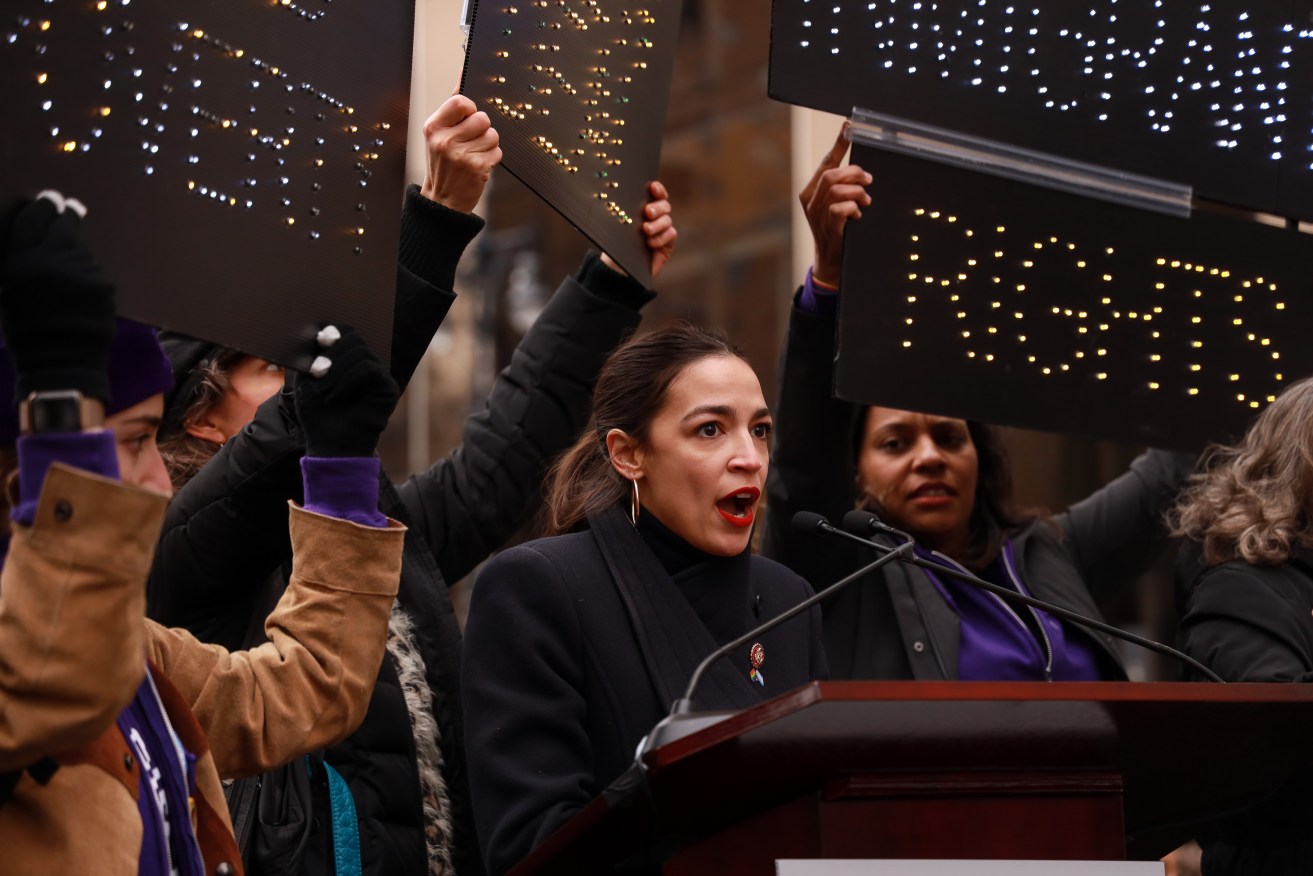Radical voices absent from Australia’s revenue debate
Where is Australia’s Alexandria Ocasio-Cortez?


Alexandria Ocasio Cortez at the 2019 Women's March 2019 in Central Park. Photo: Jason Mendez/Sipa USA
As Australia grapples with contradictory demands for quality public services and lower taxation, discussion on revenue proceeds cautiously. This gradualist, cautious debate is natural in a political context in which there are few legitimate, radical, progressive voices that capture the imagination. Meanwhile, a profound and melodious voice can be heard from our soul-mate: America.
Alexandria Ocasio-Cortez has garnered much attention in recent weeks – and not only for her dance moves. Ocasio-Cortez, the youngest woman to serve in the United States Congress, has proposed a progressive taxation bracket of over 70 per cent for incomes over US$10 million to fund a New Green Deal – a deal, by the way, that seeks a transition to a unique reliance on renewable energy, while also addressing economic inequality.
The economic argument for an aggressive rate of taxation applied to people on exceptionally high incomes is that of diminishing marginal utility. A few extra dollars in the pockets of people earning millions annually has little impact on their quality of life, but a few extra dollars in the pockets of workers makes a world of difference.
This is good social policy, as it limits fissures in our communities, and sound economic policy, as disposable income in the pockets of lower income-earners is more likely to be spent in ways that directly stimulate the economy. It is unlikely that such progressive fiscal policies are even discussed as we consider the upcoming federal election.
Radical though the proposed marginal tax bracket may seem today, it is not without precedent. Between 1932 and 1980, the average top marginal taxation rate in the US was 82 per cent. The top tax rate was 70 per cent in 1980, but fell dramatically to 28 per cent over the course of the Reagan Administration.
It is difficult to talk about the end of the world to people more concerned with how to survive until the end of the fortnight, when the next pay packet arrives.
Sweden, which did not endure a leader like Reagan, has maintained its top rate at around 70 per cent – and it kicks in at an annual salary of US$79,000. Its Nordic neighbours Finland (58.5 per cent) and Denmark (55.5 per cent) also take more than half of each dollar earned by their highest earners.
Ocasio-Cortez’s proposal is consistent with the thinking of a number of luminaries, including Nobel Laureates in economics Peter Diamond, Paul Krugman and Joseph Stiglitz. Despite support from said economists, however, the proposal elicited a hysterical, if predictable, reaction from political opponents. Taxation policy is seldom influenced by expert opinion, but is instead prone to philosophical or political tendencies.
In coupling an aggressive fiscal policy with climate policy, Ocasio-Cortez astutely addresses a political problem currently faced by progressive parties: who pays for the transition away from a carbon-intensive economy? In recent times, this has been a wedge issue for parties representing working people. It is difficult to talk about the end of the world to people more concerned with how to survive until the end of the fortnight, when the next pay packet arrives.
When debate on carbon pricing raged in Australia in 2011, Australian Workers Union leader Paul Howes threatened to pull his support for the policy “if one single job is lost”. In 2013, French food plant workers facing redundancy helped reverse President Francois Hollande’s eco-tax on heavy goods vehicles. Current President Emmanuel Macron repeated this political mistake. His decision to further tax fuel in the name of the environment gave rise to the Yellow Vest movement.
Ocasio-Cortez wants to increase revenues and improve the environment without losing support for her principal constituency: the working class.
She has considered two issues of great concern – inequality and global warming – and proposed a solution that will not split her base. This should be a salient lesson for an Australian party with the will to simultaneously address significant economic, social, environmental and political challenges.
The need to raise sufficient revenue to pay for quality public services and address inequality through redistribution remains pressing. But applying a higher marginal bracket for incomes over $1million and using the additional revenue to pay for adjustment to carbon-neutral industries, may provide a solution that is both good policy and good politics.
But don’t expect a figure like Ocasio-Cortez to emerge from the wilderness of Australian politics, where vested interests remain strong and accusations of divisive “class warfare” never far from public debate. We are a centrist, conservative lot and change will more likely come incrementally rather than in radical flourishes.
Andrew Hunter is an Adelaide writer and commentator on international relations.




